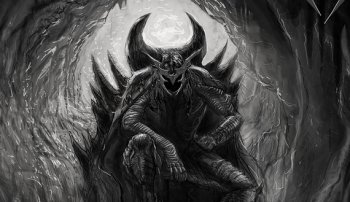
 Author Ahmed Fouad
Author Ahmed Fouad
So brace yourselves.
Nader Sadek, an Egyptian material music performer, said on their Twitter page Jan. 7 that a Masters of the Middle East show would be held Feb. 20 at Amoun resort in Giza featuring four popular steel bands: Inquisition (US), Perversion (United Arab Emirates), Smouldering in Forgotten (Bahrain) and Al-Azif (Egypt).
Inquisition, particularly, features raised lots of eyebrows. While Al-Monitor could not find any statements by the band members asserting they are actual Satanists, the band’s frontman, Dagon, said in an interview using the Isolation Grind web log in 2011 that “Black Metal is extremely satanic.”
“It is individualism, elitism, rebellion against unnecessary control, pride with a cause. Everything that [the Christian Bible] tells us about ‘the devil’ is within essence exactly what Black Metal is, but through sound waves. Forget [for] one moment about Christianity generally speaking and consider Satanism as negative pole.”
Mohammed Mamdouh, a guitarist and singer inside band Salasel, has been arranging steel concerts in Egypt since the 1990s. He told the Egyptian O News Agency (ONA) in January that debate arose in those days whenever someone metal concert organizer in Alexandria accused a different one in Cairo of including satanic rituals in the show. The problem caused anxiety in the neighborhood; some musicians and followers had been arrested and some material shows had been banned, which in turn aroused the ire of metal songs fans, after which concerts resumed.
The Manassah site stated in a Feb. 4 report that metal music started to be connected to Satanism after a write-up entitled “Satanism club in Heliopolis” ended up being posted in 1996 by Rose al-Yousef newspaper.
This was accompanied by a number of articles on the topic with such colorful headlines as “Satanism slogans from the wall space of Mansheya El-Bakry, ” “The desecration of this tombs of Commonwealth” and “Satanist prayers into the desert of Saqqara.” Manassah stated those articles clearly sought to instigate wrath against listeners and performers of material music.
And that they did. Egypt’s development site Dotmsr stated in a March article your first-time an Egyptian childhood was arrested on costs of Satanism was in 1996. Dotmsr said in 1997 an Egyptian police ended up being suspicious about their child's behavior and discovered out of the youth had accompanied friends carrying out traditions such as for instance playing and dance to heavy metal and rock songs. The officer feared they may be Satanists and detained the team. The absolute most popular such case in Egypt’s record happened that exact same 12 months, whenever 86 teenage boys and females had been arrested for presumably worshipping Satan during the abandoned Baron Palace.
While safety services stated that they had proof the young people carried out traditions worshipping Satan, those arrested denied it. Some writers and journalists started to sympathize together, saying the matter was only addressed prominently inside hit therefore it is talked about locally, not so it might be turned into a crime.
Manassah criticized the Egyptian media for deliberately linking material songs to Satanism, possibly in the directives of protection services or because journalists were not well-informed about this category of music.
In those days, material shows certainly triggered anxiety in Egypt. One reporter at Rose al-Yousef penned that Egyptian security causes had prevented 35 material bands from entering Egypt. Hamdiya Hamdi, anchor associated with the al-Alam Youghanni show, told Rose al-Yousef in 1997 the genre would lead to reading reduction, ended up being aggravating with nonsensical lyrics and had been a blind replica for the West.
Fast-forward to August 2012 when talk was revived about the suspected connection between material songs and Satanism. Ismail Wishahi, a part associated with the Freedom and Justice celebration, the governmental arm for the Muslim Brotherhood, charged that El Sawy customs Wheel, a well-known social center in Egypt, held a metal songs show for Satanists. The actual situation ended up being dismissed after a study.
Mahmoud Kbeish, a legislation professor at Cairo University, told Al-Monitor it is unsurprising your state protection services and judiciary reject satanic traditions. According to him, the latter aren't linked to freedom of belief — that will be guaranteed in full by-law — but instead involve contempt for any other religions.
Satanist teams have caused anxiety far away, such as for instance in the United States using the introduction of Charlie Manson’s "family" in 1960s, which purported to accept a satanic ideology. The gang's users committed many homicides until they were arrested and convicted in 1971. Manson said he was prompted because of the Beatles’ 1968 tune "helter-skelter."
As Inquisition may be present in the Feb. 20 show, material groups Salasel and Enrage refused to execute. Salasel's Mamdouh told ONA in January that show might be reasons for brand new conflict between steel musicians and safety services plus the community, and may end in distorting the image of this music significantly more than previously. This is basically the really reason the Egyptian Rock & steel Scene Twitter web page labeled as on Jan. 13 for boycotting the concert.
Mahmoud Kamel, a music critic, believes there isn't any connection between steel songs and Satanism. He stated all arts consist of a certain degree of extremism and really should not be evaluated in line with the techniques of some extremists.
INTERESTING VIDEO




 Glam metal (also known as hair metal and often used synonymously with pop metal) is a subgenre of hard rock and heavy metal that arose in the late 1970s and early 1980s in the United States, particularly on the Los Angeles Sunset Strip music scene. It was popular...
Glam metal (also known as hair metal and often used synonymously with pop metal) is a subgenre of hard rock and heavy metal that arose in the late 1970s and early 1980s in the United States, particularly on the Los Angeles Sunset Strip music scene. It was popular...







